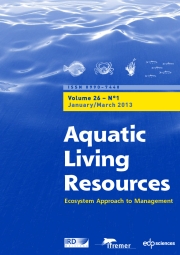Crossref Citations
This article has been cited by the following publications. This list is generated based on data provided by
Crossref.
Ernst, S.R.
Morvan, J.
Geslin, E.
Le Bihan, A.
and
Jorissen, F.J.
2006.
Benthic foraminiferal response to experimentally induced Erika oil pollution.
Marine Micropaleontology,
Vol. 61,
Issue. 1-3,
p.
76.
Mojtahid, M.
Jorissen, F.
Durrieu, J.
Galgani, F.
Howa, H.
Redois, F.
and
Camps, R.
2006.
Benthic foraminifera as bio-indicators of drill cutting disposal in tropical east Atlantic outer shelf environments.
Marine Micropaleontology,
Vol. 61,
Issue. 1-3,
p.
58.
Morvan, Julie
Debenay, Jean-Pierre
Jorissen, Frans
Redois, Fabrice
Bénéteau, Eric
Delplancke, Malou
and
Amato, Anne-Sophie
2006.
Patchiness and life cycle of intertidal foraminifera: Implication for environmental and paleoenvironmental interpretation.
Marine Micropaleontology,
Vol. 61,
Issue. 1-3,
p.
131.
Serandrei-Barbero, Rossana
Albani, Alberto
Donnici, Sandra
and
Rizzetto, Federica
2006.
Past and recent sedimentation rates in the Lagoon of Venice (Northern Italy).
Estuarine, Coastal and Shelf Science,
Vol. 69,
Issue. 1-2,
p.
255.
Bouchet, Vincent M.P.
Debenay, Jean-Pierre
Sauriau, Pierre-Guy
Radford-Knoery, Joël
and
Soletchnik, Patrick
2007.
Effects of short-term environmental disturbances on living benthic foraminifera during the Pacific oyster summer mortality in the Marennes-Oléron Bay (France).
Marine Environmental Research,
Vol. 64,
Issue. 3,
p.
358.
Albani, Alberto
Barbero, Rossana Serandrei
and
Donnici, Sandra
2007.
Foraminifera as ecological indicators in the Lagoon of Venice, Italy.
Ecological Indicators,
Vol. 7,
Issue. 2,
p.
239.
Mojtahid, M.
Jorissen, F.
and
Pearson, T.H.
2008.
Comparison of benthic foraminiferal and macrofaunal responses to organic pollution in the Firth of Clyde (Scotland).
Marine Pollution Bulletin,
Vol. 56,
Issue. 1,
p.
42.
Romano, Elena
Bergamin, Luisa
Finoia, Maria Grazia
Carboni, Maria Gabriella
Ausili, Antonella
and
Gabellini, Massimo
2008.
Industrial pollution at Bagnoli (Naples, Italy): Benthic foraminifera as a tool in integrated programs of environmental characterisation.
Marine Pollution Bulletin,
Vol. 56,
Issue. 3,
p.
439.
Tsujimoto, Akira
Yasuhara, Moriaki
Nomura, Ritsuo
Yamazaki, Hideo
Sampei, Yoshikazu
Hirose, Kotaro
and
Yoshikawa, Shusaku
2008.
Development of modern benthic ecosystems in eutrophic coastal oceans: The foraminiferal record over the last 200 years, Osaka Bay, Japan.
Marine Micropaleontology,
Vol. 69,
Issue. 2,
p.
225.
Pascual, Ana
Rodriguez-Lazaro, Julio
Martín-Rubio, Maite
Jouanneau, Jean-Marie
and
Weber, Olivier
2008.
A survey of the benthic microfauna (foraminifera, Ostracoda) on the Basque shelf, southern Bay of Biscay.
Journal of Marine Systems,
Vol. 72,
Issue. 1-4,
p.
35.
Carboni, Maria Gabriella
Succi, Maria Cristina
Bergamin, Luisa
Bella, Letizia Di
Frezza, Virgilio
and
Landini, Bruna
2009.
Benthic foraminifera from two coastal lakes of southern Latium (Italy). Preliminary evaluation of environmental quality.
Marine Pollution Bulletin,
Vol. 59,
Issue. 8-12,
p.
268.
Diz, P.
Jorissen, F. J.
Reichart, G. J.
Poulain, C.
Dehairs, F.
Leorri, E.
and
Paulet, Y.-M.
2009.
Interpretation of benthic foraminiferal stable isotopes in subtidal estuarine environments.
Biogeosciences,
Vol. 6,
Issue. 11,
p.
2549.
Coccioni, Rodolfo
Frontalini, Fabrizio
Marsili, Andrea
and
Mana, Davide
2009.
Benthic foraminifera and trace element distribution: A case-study from the heavily polluted lagoon of Venice (Italy).
Marine Pollution Bulletin,
Vol. 59,
Issue. 8-12,
p.
257.
Jorissen, F.J.
Bicchi, E.
Duchemin, G.
Durrieu, J.
Galgani, F.
Cazes, L.
Gaultier, M.
and
Camps, R.
2009.
Impact of oil-based drill mud disposal on benthic foraminiferal assemblages on the continental margin off Angola.
Deep Sea Research Part II: Topical Studies in Oceanography,
Vol. 56,
Issue. 23,
p.
2270.
Romano, Elena
Bergamin, Luisa
Ausili, Antonella
Pierfranceschi, Giancarlo
Maggi, Chiara
Sesta, Giulio
and
Gabellini, Massimo
2009.
The impact of the Bagnoli industrial site (Naples, Italy) on sea-bottom environment. Chemical and textural features of sediments and the related response of benthic foraminifera.
Marine Pollution Bulletin,
Vol. 59,
Issue. 8-12,
p.
245.
Bergamin, Luisa
Romano, Elena
Finoia, Maria Grazia
Venti, Francesco
Bianchi, Jessica
Colasanti, Andrea
and
Ausili, Antonella
2009.
Benthic foraminifera from the coastal zone of Baia (Naples, Italy): Assemblage distribution and modification as tools for environmental characterisation.
Marine Pollution Bulletin,
Vol. 59,
Issue. 8-12,
p.
234.
Sabean, J.A.R.
Scott, D.B.
Lee, K.
and
Venosa, A.D.
2009.
Monitoring oil spill bioremediation using marsh foraminifera as indicators.
Marine Pollution Bulletin,
Vol. 59,
Issue. 8-12,
p.
352.
Frontalini, Fabrizio
Buosi, Carla
Da Pelo, Stefania
Coccioni, Rodolfo
Cherchi, Antonietta
and
Bucci, Carla
2009.
Benthic foraminifera as bio-indicators of trace element pollution in the heavily contaminated Santa Gilla lagoon (Cagliari, Italy).
Marine Pollution Bulletin,
Vol. 58,
Issue. 6,
p.
858.
Armynot du Châtelet, Éric
and
Debenay, Jean-Pierre
2010.
The anthropogenic impact on the western French coasts as revealed by foraminifera: A review.
Revue de Micropaléontologie,
Vol. 53,
Issue. 3,
p.
129.
Frontalini, Fabrizio
and
Coccioni, Rodolfo
2011.
Benthic foraminifera as bioindicators of pollution: A review of Italian research over the last three decades.
Revue de Micropaléontologie,
Vol. 54,
Issue. 2,
p.
115.


